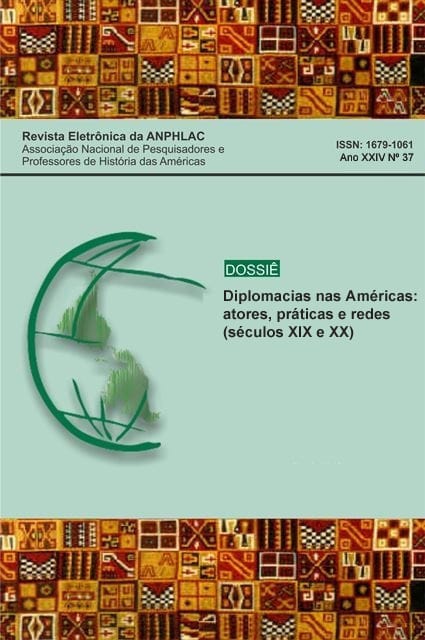The “communist” and the “last knights”:
depictions of Martin Luther King, Jr. and the FBI in the letters to John Edgar Hoover (1962-1971)
DOI:
https://doi.org/10.46752/anphlac.37.2024.4189Keywords:
FBI, Martin Luther King Jr., anti-communismAbstract
This article aims to analyze the depictions of Martin Luther King Jr. and the Federal Bureau of Investigation (FBI) contained in letters sent by civilians to the director of the Bureau, John Edgar Hoover, between the 1960s and 1970s. Although celebrated by many today, King was harshly persecuted and criticized during his lifetime. Therefore, we sought to reconstruct the portraits created about the pastor and understand the anti-communist and racist articulations behind those depictions against him, as well as the role of the FBI and Hoover in this process. We argue that anti-communism and racism, far from being characteristics of certain political positions at the time, were in fact the very frames through which political reality was interpreted by a significant part of the country’s population.
Downloads
References
BURROUGH, Bryan (2004). Public Enemies: America’s Greatest Crime Wave and the Birth of the FBI, 1933-34. New York: Penguin Press.
CARSON, Clayborne (Org.) (2014). A Autobiografia de Martin Luther King Jr. Rio de Janeiro: Zahar.
FARIA, J. P. M (2021). FBI, Movimento Negro e Guerra Fria: as Investigações sobre Malcolm X e Martin Luther King Jr. (1953-1968). Dissertação de Mestrado. Programa de Pós-Graduação em História Social. Universidade de São Paulo.
GLEN, John M (1996). Highlander: No Ordinary School. Knoxville: University of Tennessee Press.
HAGEDORN, Ann (2007). Savage Peace: Hope and Fear in America, 1919. New York: Simon & Schuster.
HALL, Jacquelyn Dowd (2005). The Long Civil Rights Movement and the Political Uses of the Past. In: The Journal of American History, Vol. 91, No. 4, pp. 1233-1263.
HARTOG, François (1999). O Espelho de Heródoto. Belo Horizonte: UFMG.
JEFFREYS-JONES, Rhodri (2007). The FBI: A History. London and New Haven: Yale University Press.
JUNQUEIRA, Mary Anne (2018). Estados Unidos. Estado Nacional e narrativa da nação (1776- 1900). São Paulo: Edusp.
LYNCH, Christian E. C (2010). A democracia como problema: Pierre Rosanvallon e a escola francesa do político. In: ROSANVALLON, Pierre. Por uma História do Político. São Paulo: Alameda.
MALATIAN, Teresa (2017). Narrador, registro e arquivo. In: DE LUCA, Tania R. e PINSKY, Carla B. O historiador e suas fontes. São Paulo: Contexto.
MAY, Elaine Tyler. Fortress America: How We Embraced Fear and Abandoned Democracy. Edição Kindle. New York: Basic Books, 2017.
MCGERR, Michael (2003). A Fierce Discontent: The Rise and Fall of the Progressive Movement in America. New York: Oxford University Press.
O’REILLY, Kenneth (1987). The Roosevelt Administration and Black America: Federal Surveillance Policy and Civil Rights during the New Deal and World War II Years. In: Phylon, vol. 48, nº 1.
POWERS, Richard Gid (2004). Broken: The Troubled Past and Uncertain Future of the FBI. New York: Free Press.
ROEDINGER, David R (2007). The Wages of Whiteness. London & New York: Verso.
SULLIVAN, William C. e BROWN, Bill (1979). The Bureau: My Thirty Years in Hoover’s FBI. New York: W. W. Norton & Company.
THEOHARIS, Athan (Org.) (2000). The FBI: A Comprehensive Reference Guide. New York: Oryx Press.
THEOHARIS, Athan (2004). The FBI and American Democracy: A Brief Critical History. Kansas City: Kansas University Press.
TYSON, Pearline M (2010). FBI Paranoia: The FBI’s War Against CORE & SNCC, 1956-1971. Dissertação de Mestrado. Morgan State University, 2010.
Downloads
Published
How to Cite
Issue
Section
License
a. Cessão de direitos autorais
Venho, por meio desta, ceder em caráter definitivo os direitos autorais do artigo "____________", de minha autoria, à Revista Eletrônica da ANPHLAC e afirmo estar ciente de que estou sujeito às penalidades da Lei de Direitos Autorais (Nº9609, de 19/02/98) no caso de sua infração. Autorizo a Revista Eletrônica da ANPHLAC a publicar a referida colaboração em meio digital, sem implicância de pagamento de direitosautorais ou taxas aos autores.
b. Declaração de ineditismo e autoria
Atesto que o artigo ora submetido à Revista Eletrônica da ANPHLAC, intitulado "________________________", de minha autoria, nunca foi publicado anteriormente, na íntegra ou em partes, dentro do país. Vindo a ser publicado na Revista Eletrônica da ANPHLAC, comprometo-me a não republicá-lo em qualquer outro veículo editorial.






